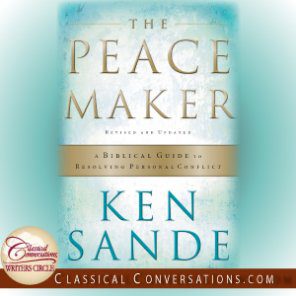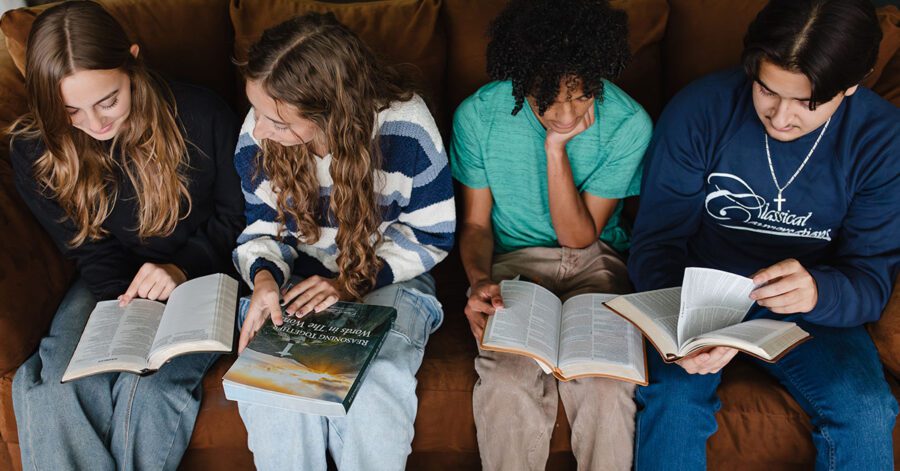The Peacemaker Monthly
Seeing the Hearts of Others
by Cara McLauchlan
“Instead of focusing on our own desires or dwelling on what others may do, we will rejoice in the Lord and bring him praise by depending on his forgiveness, wisdom, power, and love as we seek to faithfully obey his commands and maintain a loving, merciful, and forgiving attitude” (page 259, The Peacemaker).
A friend of mine once said, “We all have our own symphony of life playing out in our hearts.” What she meant was, everyone has their own set of hurts, worries, circumstances, and challenges swirling in their souls. Sometimes this might be a symphony of beauty, sometimes of heartache. She encouraged me to remember this when I wanted to be quick to judge others’ actions or make assumptions about hurtful situations.
As we close out our walk through the book, The Peacemaker, I think the last two chapters wrap up on the most difficult tasks of all: looking to the interests of others and overcoming evil with good. Yet this should not be hard for us as Christians. Sometimes it is not so hard when we support charity projects or give of our time, talents, or resources to projects we choose, but when it comes to conflict and the people we love, it feels as though all bets are off.
Philippians 2:4 states, “Each of you should look not only to your own interests, but to the interests of others.”
I find it strange that I can be more forgiving of a stranger, than of my own family members’ actions in disagreement. Sande discusses the point that putting the relationships above being “right” needs to be the biggest priority in resolving conflict.
“All too often, we ignore the feelings and concerns of the people and focus all of our attention on the problems that separate us. This approach often causes further offense and alienation, which only makes conflicts more difficult to resolve” (page 231, The Peacemaker).
Sande encourages us to pursue the higher path of understanding the hearts of those we face. He advises us to practice this through deep listening, questioning, and understanding the interests of those with whom we are in conflict, but the very best weapon for conflict resolution Sande describes as “deliberate, focused, love.”
“Instead of reacting spitefully to those who mistreat you, Jesus wants you to discern their deepest needs and do all you can to meet those needs. Sometimes this will require going to them to show them their faults. At other times there may be a need for mercy and compassion, patience, and words of encouragement” (page 254, The Peacemaker).
I don’t know about you, but when I finally get enough perspective on a difficult situation and decide to take the high road with love, something inside me changes. To me, it almost feels like my soul grows, something expands in me. I am lighter as a result. It must be from letting go of the anger, hurt feelings, or the poisonous thoughts of animosity. I am not saying this is easy, but the weapon of deliberate, focused love can be a healing balm to the soul.
Sande encourages us to use the divine weapons for good, “These weapons include Scriptures, prayer, truth, righteousness, the gospel, faith, love, joy, peace, patience, kindness, goodness, faithfulness, gentleness and self-control” (page 248, The Peacemaker).
He reminds us that the divine weapons are the very same weapons Jesus used to defeat Satan. These tools are the perfect arsenal for dealing with conflict in this world. There is something very equipping about remembering all the resources we can use for good; they are almost like secret powers available to us anytime.
The next time I want to feel hurt or offended by someone’s actions, I want to be like my friend and think about the symphony playing out. Instead of being quick to react or assume the worst about someone, I hope to pause and consider their viewpoint. Most importantly, I will seek to call upon the divine weapons that Christ has equipped us with in order to deeply understand. I will listen for Christ’s whisper first. Then I will listen for a symphony that I might be hearing for the first time.
Read Along in The Peacemaker
Read Part 4 – Go and Be Reconciled – Chapters 11 and 12 (page 225-257)
Good Questions:
- Have you ever longed for someone to truly understand your situation?
- What does it require to deeply understand someone else’s perspective?
- Describe a time when you took the time to understand a situation and if your mind was changed as a result.
- Have you made assumptions during conflict that later proved false? How did you handle it?
- Do you find it easier to manage conflict with strangers or those close to us? Why do you think that is?
- What is your greatest takeaway from reading Ken Sande’s The Peacemaker?




